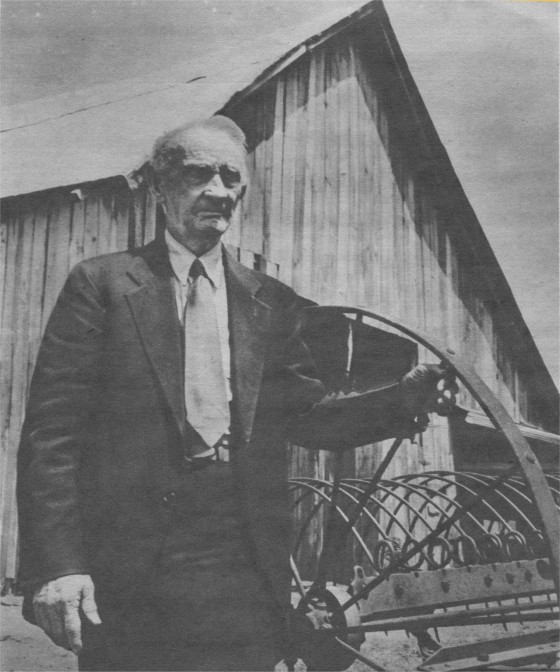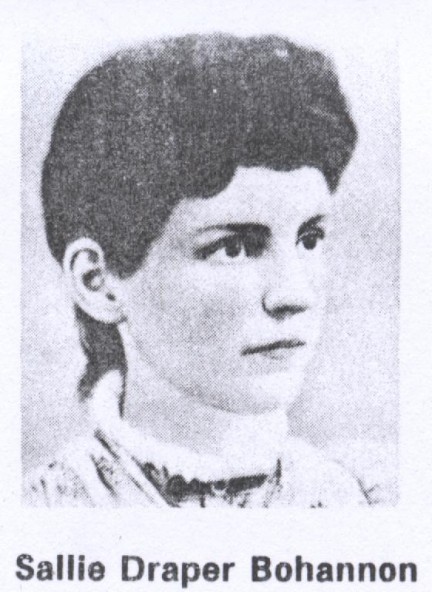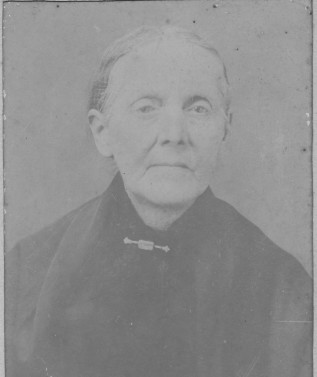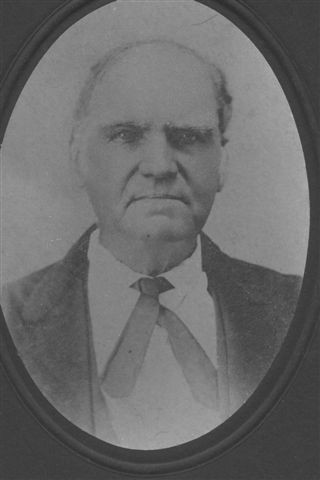|
Judge LD Bohannon |
||
|
Judge Lee Bohannon stands in front of the barn he built at age 93. His property was located on West Main Street in Livingston.
|
||
| Tucked away in a scrapbook that belonged to my mother, a couple of articles had been saved from a newspaper, probably The Tennessean, written about the life of Leonidas Decatur Bohannon. Most who remember this fellow knew his as Judge Bohannon. He was my great-great-uncle by marriage, having married my grandmotherís aunt, Sallie Ann Draper. The parents of Sallie Ann Draper were Edward Bradley Draper and wife Emily Wakefield Goodbar Draper, my great-great grandparents on my father's side of the family. I was named for my great-great grandmother. Here is what was written in one of the newspaper articles: | ||
|
Sallie Ann Draper Bohannon was the wife of Judge Lee Bohannon. She died when their four children were still quite young.
|
||
|
"One of the most colorful of all the staunch American citizens for which this upper Cumberland country long ago became famous is Judge Leonidas Decatur Bohannon who will celebrate his ninety-fifth birthday on November 11 at the pretty old home here where he lives with his daughter, Miss Geneva." "When he was born to the Thomas Jefferson Bohannons at Eldridgeís Cove, ten miles South of here, Overton County was just twenty-eight years old and his parents named him for the famous Spartan king and the heroic American naval officer, hoping that he might succeed as well as they did in the hard years which were looming ahead." "Not until he was twenty years old did he start to school and even then, he had to miss a lot to pull fodder, shear sheep, make molasses, gather corn, sow wheat, and cut wood to help the family along. From 1875 to 1877 he attended Cumberland Institute near Sparta, a school organized mostly for the sons of poverty stricken and wounded or dead Confederate soldiers. He and four other youngsters had a hard time paying ten cents each a month for rent on a little log cabin where they lived, cooked their meals from potatoes, corn meal and sow belly which they brought from home, and read law from borrowed books." "Young Bohannon had seen his father ruthlessly slain on February 10, 1865 by the men of Tinker Dave Beatty, notorious outlaws of this region, and he at once had to assume much responsibility for holding the family together. His mother lived with him for many years and he was grown before he first came to this town on a mule to pay $4.50 tax due on their farm. He explained that he loved oxen and for half a century, kept from three to four good yokes." "In his long and rugged life, as he describes it, he has been deputy county court clerk, deputy circuit court clerk, and deputy clerk and master for Overton County. Later he was county court clerk for four years and then county judge for eight years before he served one turn as a member of the Tennessee House of Representatives under Gov. James B. Frazier. He served on as county judge for twenty-five years, an office which gave him the popular title "Judge" by which everybody here knows him, until his retirement at age eighty-eight in 1942." "When young Bohannon returned from the Sparta school, he rented a log cabin in which to live near here, and he remembers that it wasnít long till he was courting the ownerís daughter, Sallie Draper, across the rail fence which separated their places. On August 12, 1888, they were married, but she died eleven years later and left him with four small children." "He jokingly says he has always been afraid of women, so he chose to rear the four Bohannon orphans rather than find a step-mother for them. A son, Shirley D. Bohannon, killed in World War I; a son, Howard T., a Texas Rio Grande Valley fruit farmer; a son, Byrd W. Bohannon, a postmaster at Little Valley, New York; and a daughter, Miss Geneva Bohannon, with whom he lives on the 125 acre family farm at the edge of town, formed his family." "The affable judge has been a Mason for seventy years and has had a longer service in the lodge in this county than any other man. Though he lost nearly all his earnings in the depression of the Ď30's, including 2000 acres of coal land near Monterey, he declares he is the happiest man in the country. He eats heartily, preferring sweets, reads well, usually without glasses, and sleeps like a baby. He has only a slight impairment of hearing and has never been seriously ill." "He recalls early trips to Nashville on Cumberland river steamboats when he wore homemade jeans, but now he rides airplanes to see his sons in Texas and New York and wouldnít go any other way. He is a non-church member but says he worships God in whom he devoutly believes in his own way." "The judge is a Democrat of the old school. His first vote for governor was for Benton McMillan and he says he lost several presidential ballots until Grover Cleveland came in. He thinks Austin Peay has over-shadowed all governors until now but is confident Governor Browning will surpass him and thinks he has started on a career that could wind up in the White House. He managed the governorís campaign here twice and won both times. "The Bohannon hobbies still include croquet and checkers, and though he has fished and hunted deer, he says he never had much success. He attributes his long life to never over-eating or over-working and to plenty of undisturbed sleep. He has never smoked or drunk coffee but he says he has been an inveterate tobacco chewer for seventy years." "Not until he was grown did Judge Bohannon meet Cordell Hull who was born a few miles across the hill from him. Since then, they have been warm friends. Another long-time friend is James Martin who is exactly his age." Another newspaper article written about Judge Bohannon says this: "Judge Bohannon remembers vividly the ugly day his father, a blacksmith, was brutally slain when Tinker Dave Beattyís men raided the Bohannon farm. The war not only cost his fatherís life, but his family, his mother, an older sister, a young brother, and himself, found themselves stripped of all their possession save an old gray mare and two old spotted cows. He still marvels at his motherís courage. "The Federals took everything we had but they couldnít stop Mother. She was a strong woman and a good gardener. She took a plow, went to new ground and made a crop of corn. All of us chipped in and worked together that summer, barefooted, in the corn patch. I was little and scared but I guess I was as tough as the rest of them." They had the help of a freed Negro woman and her son who insisted upon starving it out with the Bohannons. The Negro lad hired out to them for ten bushels of corn a month, a salary of about forty cents." "Somehow between spinning, weaving and farm chores, Judge Bohannonís mother found school books for her children, a primer from which the Judge learned to spell and read, and several history books." "The summer before he turned twenty-one, he heard an oratorical exhibition. After that, one thought possessed him: "If other young people could learn, I could too." So, in 1874, bigger than the rest and scared to death to stand up before all those little children, Lee Bohannon went to school at Pond Ridge, Tennessee. He paid his way by working for the teacherís grandfather. The school was too far from his home for walking and he rented a deserted cabin for himself and a friend, Jim Walker, with whom he started school. He earned money in all sorts of ways - by making a crop, hauling apples to wildcat stills, and one summer, by raising a sow and selling her, the price $7.50." "An Overton County neighbor paid his tuition at Cumberland Institute near Sparta. By his own admission, he did himself proud. He was encouraged by two college professors to enroll in Cumberland University and major in mathematics. He couldnít afford more education. Instead, he began teaching school and in his spare time, studied law. His friend, Jimmy Wright, chairman of the county court at the time, lent him law books. "Wright assigned me lessons and heard me recite them. I enjoyed studying. Iíd shell corn for a while and then read a while." His examination for the bar was highly informal to Bohannonís surprise. He paid a call on his friend Judge Ridley Goodpasture shortly before the day he expected to be tested. Judge Goodpasture asked a few questions, Bohannon answered them. "Youíve passed," Goodpasture said. Thus at twenty-five, four years after his first lesson in any school, Bohannon was a licensed lawyer. His first case was the defense of a gambler. His first fee was $2.50." Another newspaper article my mother saved about Judge Bohannon tells about the celebration of his 97th birthday at his home on West Main Street in Livingston. The article mentions the fact that my grandmother, Ninnie Draper McCormick, was in the large number of guests and says that her birthday was the next day, November 12th. Judge Bohannon died at his home on West Main Street in Livingston on September 21, 1953, after being in failing health for several months. He would have been ninety-nine years old the following November 11th. Some information about the wife of Judge Bohannon was provided to the
Overton County Retired Teachers Association by Byrd Bohannon, a son. In
the letter, he says this about his mother: |
||
|
Emily Wakefield Goodbar Draper, mother of Sallie Ann Draper Bohannon, mother-in-law of Judge Lee Bohannon, and was my great-great grandmother that I was named after. |
Edward Bradley Draper, the father of Sallie Ann Draper Bohannon, father-in-law of Judge Lee Bohannon, and was also my great-great grandfather.
|
|
|
I found information on the internet about the parents of Judge Leonidas Decatur Bohannon. His father, Thomas Jefferson Bohannon, was born in 1825 in Overton County, and his mother, Sarah Caroline Eldridge Bohannon, was born in 1826. She died in 1891. There were three children, Isabell, Boone, and Leonidas Decatur. I have spent many hours in the home of Judge Bohannon when I was growing up. It was located in the area of the bypass and McDonaldís Restaurant here in Livingston. I can picture in my mind just exactly how the rooms looked in that home. Because I was only eight years old when Judge Bohannon died, I donít remember too much about him. I do remember that he was always very kind and gracious to all my family and made us very welcome in his home. After he died, Judge Bohannonís daughter, Geneva, was always present for any kind of family gatherings we had. She was a very frequent visitor in the home of my Aunt Rose McCormick. For the short time that I took piano lessons when I was in grade school, I was allowed to practice on the piano in the Bohannon home since we didn't have one in our home. All that time, I had no idea that house once belonged to my great-great grandparents, Edward Bradley Draper and wife Emily Wakefield Goodbar Draper. In fact, I became aware of this information while doing research for this story. Another memory I have is the many hours spent playing at what was once known as the Bohannon spring across the road from their home. That spring now belongs to Neal and Brenda Winton. Even though I spent a lot of time looking through my motherís scrapbook while I was growing up, I was never interested enough then to read about the accomplishments of Judge Bohannon. Iím very glad she saved those articles and that I can now preserve that information. To have never gone to school until he was twenty years old, Judge Bohannon is truly an excellent example of how successful a person can be if determined enough to overcome tremendous obstacles sometimes encountered along lifeís way. |
||



